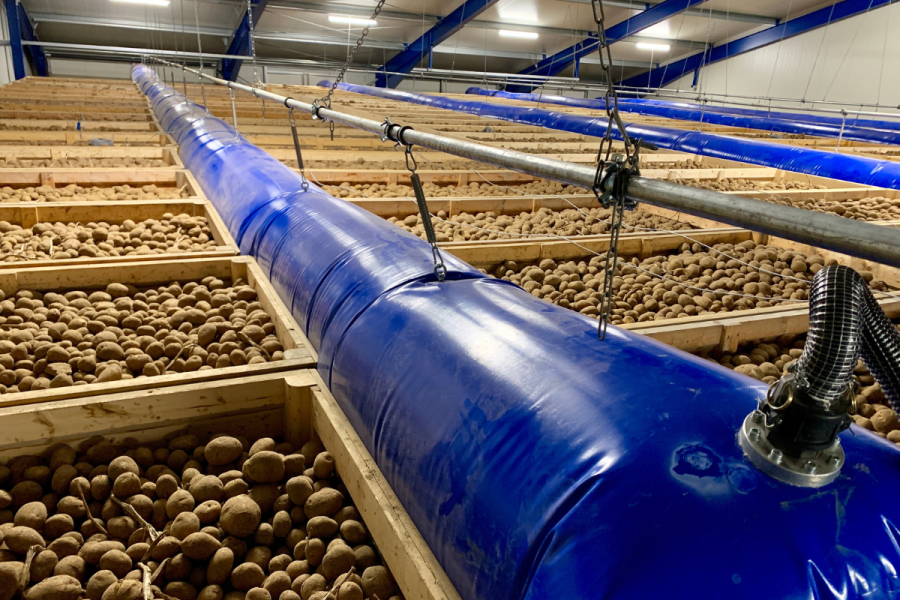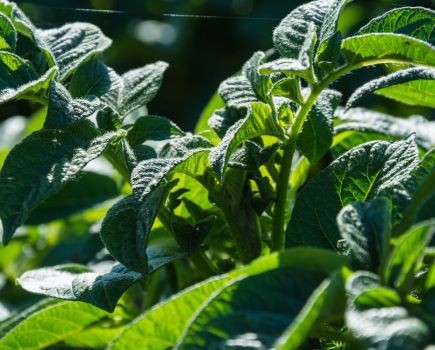After the withdrawal of chlorpropham (CIPC) as a sprout suppressant, potato store management has had to adapt to using volatile products such as Biox-M (spearmint oil), ARGOS (orange oil), 1,4SIGHT (1,4-dimethylnaphthalene, DMN) and ethylene (Biofresh and Restrain). CPM takes a look.
“Since the withdrawal of CIPC the industry has been on a learning curve and as we have had different products to adapt to in a short space of time.”
Although approved in other countries, such as the Netherlands since 2015, the 2022-2023 storage season is the first since DMN received authorisation for use in GB. Its first year’s use in this country has been under atypical conditions because the 2022 crop of potatoes went into store at high temperature, with high rates of respiration.
Frontier Agriculture crop production specialist Dr Reuben Morris says: “We have seen from seed potatoes that last year’s conditions resulted in unusual physiology, so the 2022 crop would have been challenging for any sprout suppressant.
“We knew we would need to bring the respiration rates down as soon as possible after putting the crop in store, so we often applied two full doses of DMN early in the season – it worked well, moving these lively crops into a state of dormancy.”
The potato crops Frontier Agriculture oversee are mainly for processing – including crisping – and he notes that last year significantly more DMN was used than Biox-M or ARGOS, despite it being its first year in GB.
Reuben explains that work at the now closed AHDB Sutton Bridge Crop Storage Research had identified that contact sprout suppressants like spearmint oil and orange oil would need something to help them. Consequently MH (maleic hydrazide) became a focal point of sprout suppression.
However, he is of the opinion this may change, at least for some varieties, because DMN is expected to offer stronger sprout suppression especially in warmer stored crops, such as chipping and crisping.
“As we get more experienced with DMN and how we can make the most of it, the use of MH may decrease on reliably long dormant varieties.
“In addition, it is quite possible that stores using DMN, which has residual activity, will not need to apply a sprout suppressant towards the end of storage to increase shelf life.”
He comments that the only downside to DMN is that it has a 30-day withholding period, and that it is governed by an MRL of 15 mg/kg.
“Since the withdrawal of CIPC the industry has been on a learning curve and as we have had different products to adapt to in a short space of time, close adherence to the manufacturer’s advice has been key to optimising performance.”
Reflecting on the last few years, he notes that the industry has had no option but to adapt. “In the first year we only had Biox-M. So, it was a case of getting on with the job, ensuring the best possible outcome, and it worked well.
Then Argos received authorisation, and although in many aspects it seems similar, because it has to be applied at higher volume fogging has to be done more slowly to prevent issues with condensing.
Reuben adds that ethylene is applied by some store managers using an automated ethylene generator.
“As shelf life after using ethylene is short, store managers may opt for an application of Biox-M or Argos before moving potatoes from these stores.”
The new sprout suppressants are volatile, and their application needs more attention to detail than was necessary with CIPC. So, one of the ways Frontier Agriculture has ensured best service to their customers is investment in new electro-foggers, reveals Dr Morris.
“Our view is that moving away from the older machines used for fogging CIPC has optimised applications so that our customers have the best possible sprout control,” he says.
Acceptable results despite difficult start to storage season
Because of the warm autumnal weather in 2022, the start of the potato storage season was difficult but by Christmas results became more acceptable, reflects Jon Kemp of Mercian, the UK’s largest single supplier of crisping potatoes.
There were particular difficulties with ambient stores, as it was difficult to bring the high harvest temperatures down, and even those with refrigerators were suffering, partly due to the cost of electricity.
Jon says: “Temperatures are hugely important when it comes to potato storage because a lower temperature slows the crop’s respiration rate and physiological activity.”
By Christmas, storage was under control for most crops, but those that had not received an application of maleic hydrazide (MH) in the field, continued to have difficulties.
“Most irrigated crops received MH, but in unirrigated ones application was more hit and miss.
“Without the residual effect of MH, and given the warm temperatures, sprout control was not as effective as we would have liked, and there were crops which could not be held in long-term storage and needed selling to move them out of store. This highlights the importance of applying MH in the field.”
He reveals that three years ago Mercian took the decision to take on fogging of sprout suppressants for themselves.
“The aim was to understand more about it, particularly in the light of the withdrawal of CIPC and the move to newer, less tested sprout suppressants, particularly as the oils were used reactively rather than pro-actively.”
His current product choices are DMN and Argos, and in bulk stores he uses a combination of both, while in box stores he opts for DMN because it is more mobile and therefore can get through between the boxes to give good coverage and sprout control.
Jon adds that they have used mint oil (Biox-M) in the past. “We had to make a choice because the fogging machines we use can only be used with one oil, and as both mint and orange oil are good, the decision was taken on price rather than efficacy.”
Looking forward to this year’s crop, he reports that applications of MH have gone on well, and, trusting that the weather dries up in September, and that the drier weather creates a relatively average storage season ahead.
“With regard to sprout suppressants, we are now in a good place as we have a choice, and each has its own speciality of when and where to use.
“In the crisping industry, we still have some more to learn about DMN, but we are finding it to be an effective and useful product.”
DMN helps potato storage industry address loss of CIPC
The withdrawal sprout suppressant chlorpropham (CIPC) challenged the storage industry as there was no like-for-like substitute. The approval last year of DMN has eased the situation, according to Tony Hull of Superfog.
“One of the important characteristics of DMN is that it works on preventing sprouting and stopping existing sprouts,” says Tony. “It is also easier to fog with than some of the other sprout suppressants, and it does a very good job.”
Last year saw some physiologically very aged, stressed potato crops going into store, he recalls. “Nevertheless, we found that two applications of DMN held the crops until March or April, depending on the variety and store management capabilities.”
He explains that, as before, sprout suppressants, all need careful consideration by contractors and store managers before, during and after an application. Keeping product in the store as long as possible helps and store managers should consider ambient ventilation carefully.
“However, if CO2 levels are important then they should be monitored and controlled accordingly, if possible with short ventilation periods.”
The way boxes are stacked can make even applications more difficult to attain, and he recommends the use of slow-moving fans when applying DMN to pull the product around during and for about 45 minutes after application. After that fans can be switched off and DMN allowed to distribute naturally.
“The ideal is to blow fog into open space; in bulk stores this may mean blowing over the top of the bulk heap, and then using slow fans to recirculate. In box stores it is important to have a good sized area at point of fog entry without hitting potatoes because if DMN liquid settles on potatoes then some skin damage can occur.”
Looking back to the time immediately after the withdrawal of CIPC, the only real option available as a sprout suppressant in the processing sector had been BioxM (mint oil), he says.
“As the MH wore off, BioxM burnt off any sprouts, but the challenge was that the sprouts wanted to regrow, so as a fogging contractor, we were very busy in May, June and July.”
The next year ARGOS (orange oil) received its registration, but despite high hopes, he found inconsistent results, some were due to variety, yet there were differences even between fields.
“Now that we have DMN, an application of MH in the field followed by an early application of DMN can act as prevention rather than cure.”
This article was taken from the latest issue of CPM. Read the article in full here.
For more articles like this, subscribe here.
Sign up for Crop Production Magazine’s FREE e-newsletter here.




